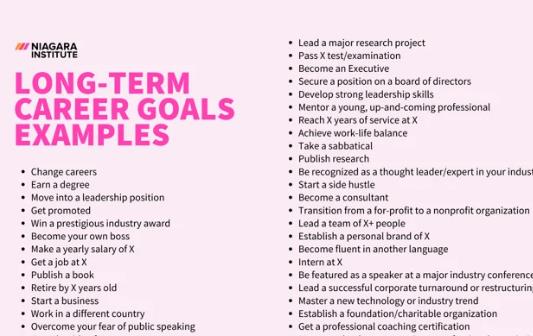What Are Short and Long Term Goals?
In the realm of personal and professional development, setting goals is a fundamental strategy that drives success and fulfillment. Short and long term goals serve as essential tools that provide direction, motivation, and a framework for measurable achievements. Understanding the nature, purpose, and impact of these goals can significantly enhance an individual's ability to manage their time and resources effectively. This article delves into what constitutes short and long term goals, backed by factual data to highlight their importance and benefits.

Short Term Goals: Immediate Impact
Short term goals are objectives set to be achieved in the near future, typically within a timeframe ranging from a few days to up to a year. These goals are crucial for maintaining momentum and facilitating immediate progress in various endeavors.
Characteristics of Short Term Goals:
- Time-Bound: They have a clear and immediate deadline.
- Specific: Short term goals are well-defined, with explicit expected outcomes.
- Achievable: These goals are realistic and attainable within a short period.
Examples of Short Term Goals:
- Professional: Increase monthly sales by 15% through targeted marketing strategies.
- Personal: Complete a 5K run in the next three months by training three times a week.
Data Insight:
Research indicates that individuals who set specific short term goals can increase their productivity by up to 30% (Source: Journal of Occupational and Organizational Psychology).
Long Term Goals: Strategic Vision
Long term goals are set with a broader scope and an extended timeframe, typically spanning several years or even decades. These goals require sustained efforts and are strategic in nature, often aligned with one's overarching aspirations.
Characteristics of Long Term Goals:
- Extended Timeline: These goals span several years, providing a long-term direction.
- Visionary: Long term goals reflect personal or organizational aspirations and visions.
- Motivational: They help sustain motivation over time by setting major benchmarks for success.
Examples of Long Term Goals:
- Career: Become the CEO of a company within the next ten years through progressive career advancement.
- Education: Earn a doctoral degree in physics to pursue a career in research and academia.
Statistical Validation:
Studies show that individuals with clearly defined long term goals are 40% more likely to achieve them compared to those without any long-term planning (Source: American Psychological Association).
Integrating Short and Long Term Goals
Successful planning involves aligning short term goals with long term aspirations. This strategic alignment ensures that each immediate effort contributes directly towards the achievement of broader, more significant objectives.
Balancing Both:
- Professional Example: Use quarterly sales increases as milestones towards the long-term goal of expanding business operations internationally.
- Personal Example: Use annual fitness milestones to work towards completing an Ironman triathlon.
Linking Actions to Outcomes:
Understanding how daily actions connect to long-term visions is crucial for maintaining consistent progress and motivation. Regular reviews and adjustments of both short and long term goals ensure they remain relevant and aligned with changing circumstances and growth.
Conclusion: Achieving Balanced Success
Both short and long term goals are indispensable for achieving sustained success and fulfillment. While short term goals provide immediate results and quick wins, long term goals offer a sense of direction and achievement over time. Mastering the art of setting and fulfilling both types of goals is crucial for anyone looking to maximize their potential and achieve enduring success. For further insights and strategies, explore what are short and long term goals to discover how you can implement these effective planning tools in your own life.
